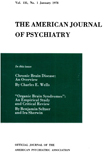BRIEF OBJECTIVE MEASURES FOR THE DETERMINATION OF MENTAL STATUS IN THE AGED
Abstract
1. Data are presented on a random sample of 1,077 persons residing in homes for the aged, nursing homes and state hospitals in New York City, who were 65 years of age or over at the time of first admission. Each person was examined by a psychiatrist using a standard interview technique, and by a psychologist who administered two brief tests: the face-hand test, and a 10-item questionnaire testing orientation and recall of personal and general information.
2. The results of both tests were highly related to psychiatrists' clinical evaluations of the presence and degree of chronic brain syndrome, the presence or absence of psychosis associated with chronic brain syndrome, opinion as to certifiability, and degree of management problem.
3. It is concluded that the face-hand test and the mental status questionnaire are valid measures for the determination of mental status in the aged, particularly for disorders associated with cerebral damage.
4. These tests are considered to have a considerable potential clinical usefulness for rapid screening purposes. They provide an objective basis for uniformity of observation and evaluation by different observers. The brevity and objectivity of these tests make them desirable procedures for research purposes.
Access content
To read the fulltext, please use one of the options below to sign in or purchase access.- Personal login
- Institutional Login
- Sign in via OpenAthens
- Register for access
-
Please login/register if you wish to pair your device and check access availability.
Not a subscriber?
PsychiatryOnline subscription options offer access to the DSM-5 library, books, journals, CME, and patient resources. This all-in-one virtual library provides psychiatrists and mental health professionals with key resources for diagnosis, treatment, research, and professional development.
Need more help? PsychiatryOnline Customer Service may be reached by emailing [email protected] or by calling 800-368-5777 (in the U.S.) or 703-907-7322 (outside the U.S.).



